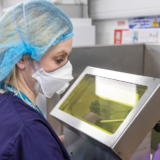Board Member Peter Kellner writes about the role of Medicines Discovery Catapult and the importance of collaboration post-Brexit
Britain’s long-term prospects, post-Brexit, will plainly be affected by our trading arrangements with the rest of Europe and the wider world. The full impact may not be clear for some years. But, as this week’s industrial strategy published by the Government rightly makes clear, our prospects also depend on our ability to convert Britain’s undoubted strength in innovation and science into products and services that are made in Britain; and that is down to us.
Not for the first time, medicine provides some of the most exciting opportunities. In the 1940s, the production of penicillin by Glaxo at Barnard Castle transformed the industry. Today, we are unlikely to find an equivalent, single magic bullet; but the challenges facing the industry, and future opportunities, are just as great as in pre-penicillin days.
Bluntly, the existing global model for developing medicines is failing. The process takes longer and costs more than it used to. Success rates are declining just as patient demand is rising, and the return on investment to the top tier of “big pharma” has fallen.
Involve patients and their stakeholders
In principle, the way forward is clear. Involve patients and their stakeholders in the prioritisation of what medicines are most needed, then take advantage of the latest advances in DNA and gene technologies to craft chemicals and biologicals into such products.
The tricky bit is converting this approach into practical steps that can end up improving both the world’s health and Britain’s economy. Medicines Discovery Catapult, established by Innovate UK, is well placed to help. As a new business, it has no financial or institutional stake in the old model. And as a not-for-profit company, it is able to promote and support genuinely collaborative research. It can help bring together the R&D strengths of charitable, private, academic and service sectors in ways that advance the interests of all these sectors and threaten none of them.
For example, many patient charities fund important academic research and have valuable data sources and relationships. Working with the Catapult, with its independent expertise and capacity to bridge the gap between that research and commercial applications, charities have a trusted partner. Together we can help to speed up the process of getting new therapies to those that need them. Already a number of patient charities are discussing plans for collaborative R&D with us– as are universities and biotech and contract service companies. We hope to make early progress in areas like antimicrobial resistance, inflammation and diseases of the central nervous system, such as Parkinson’s and dementia.
Enhancing jobs, investment and prosperity
Success in any, let alone all, of these quests would make a big difference to many people throughout the world – and also enhance jobs and investment, and hence prosperity, in Britain.
That is not all. As a director of the Catapult, and also chairman of NCVO (the National Council for Voluntary Organisations), and formerly President of YouGov, Britain’s pioneering online polling company, I have engaged with all four sectors: private, public, academic, voluntary. I am more convinced than ever that modern societies succeed when, and only when, these four sectors all pull together.
This means moving on from the old binary debates about public and charity versus private enterprise, and avoiding the traps associated with such activities as “picking winners” and imposing red tape. Even without Brexit, a new, more flexible, business ecology would be needed to encourage innovation that serves us all. With Brexit, that need is especially urgent for Britain. Developing new medicines can inform that wider business and political agenda, as well as help to fight some of the world’s most serious diseases.




